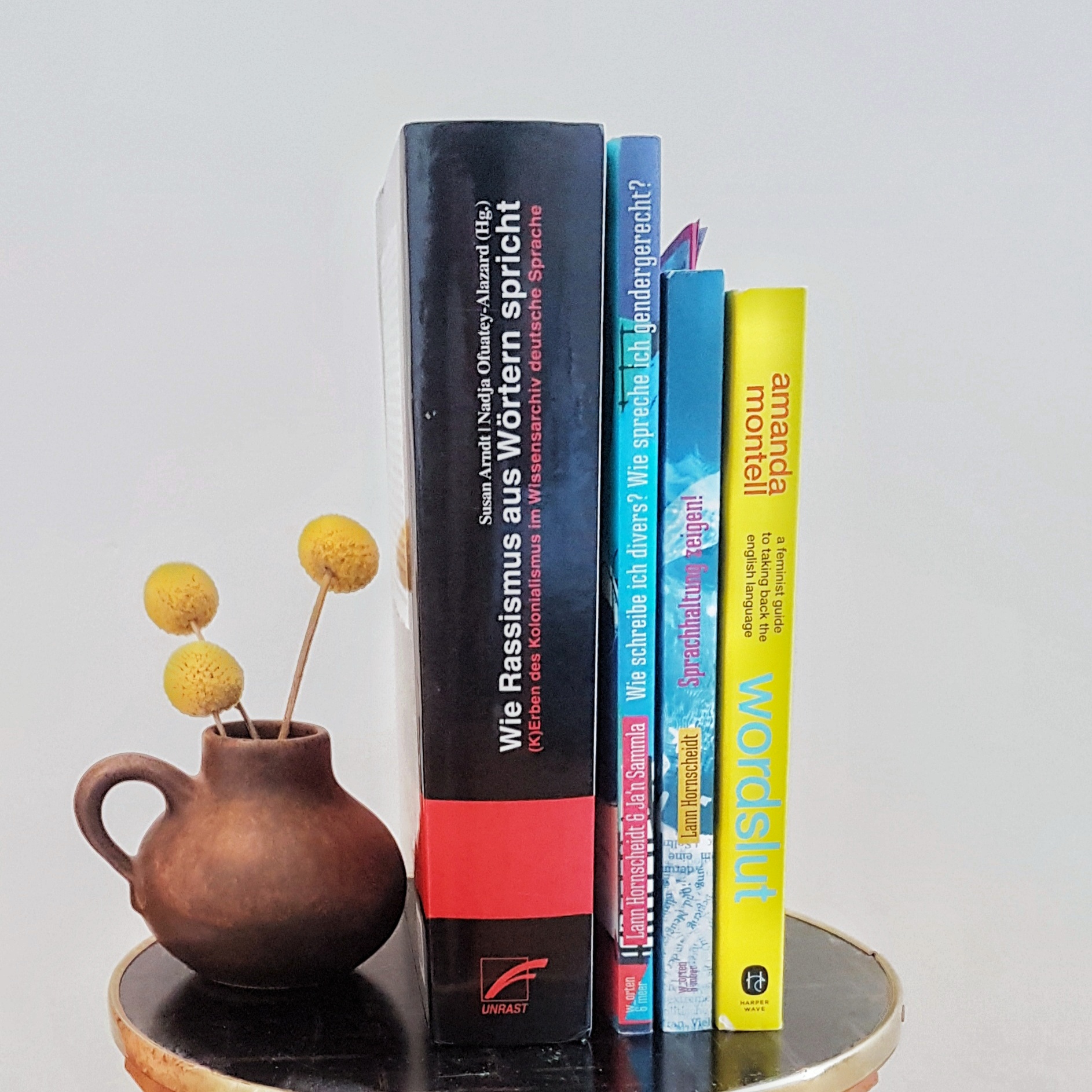
4 Books about Language, Race and Gender
As part of our macht.sprache. project, we dealt in depth with concepts related to race and gender. For this, it was necessary to understand how linguistic discrimination works and that it is part of discriminatory social structures. Here we present 4 books (3 written in German, 1 in English) that have shaped our thinking about concepts and terminologies around race and gender. These books were particularly important to us in the development of macht.sprache.
Sprachhaltung zeigen! Ein Argumentationsleitfaden für diskriminierungskritisches Sprechen und Schreiben by Lann Hornscheidt
This book will speak to anyone who fundamentally wonders why political debates around language – be it the question of gendering or changing racist terminology in children’s books – are relevant. In Sprachhaltung zeigen!, Lann Hornscheidt assembles numerous arguments for using and creating new forms of language. It is a plea for precise forms of expression. All the arguments used are based on the desire to treat each other with respect – in other words, to address people in the way they want to be addressed and to choose words in such a way that everyone feels they are included. Since new forms of language designed to overcome discrimination always challenge what is currently understood as normal in a particular context, Hornscheidt also immediately points to the usual resistance to linguistic development. Those who can understand why people resist language changes, Hornscheidt explains, can strengthen their own convictions and arm themselves for discussions.
The book is written in an accessible manner and the individual chapters can also be consulted independently. For this reason, there are some repetitions. Sprachhaltung zeigen! not only explains in content and argument that language changes are possible, but also shows a possible way of practicing such change: Hornscheidt repeatedly uses the ens form, which is introduced in the book Wie schreibe ich divers?
2021, w_orten & meer
Wie schreibe ich divers? Wie schreibe ich gendergerecht? by Lann Hornscheidt and J’an Sammla
This practical handbook on gender and language is completely oriented towards application. In a short introduction, Lann Hornscheidt and J’an Sammla make clear that there is more than the dichotomy of man and woman. They motivate readers to reflect this linguistically. First, they present general strategies for people to express themselves in a more gender-inclusive way in German: By using a gender-inclusive variant, a gender-neutral variant, or a form that names genderism – that is, gender-based violence and discrimination. For each variant, there are numerous formulation suggestions, also in relation to different types of words and lived situations. What is particularly nice about the book is that it shows how diverse gender-inclusive expression can be, that new forms are always being added (like the new gender-free form ens), and that different forms can coexist.
2021, w_orten & meer
Wordslut. A feminist guide to taking back the English language by Amanda Montell
This book is an easy-to-read introduction to sociolinguistics, drawing on the English language and the U.S. context. Montell humorously exposes which terms are used in gender-specific ways, even if they initially appear gender-neutral – including job titles (doctor, nurse) and descriptions of people (bossy, pansy). She goes further, explaining that really everything to do with language is assigned a gender identity. In addition to individual groups of terms, this also includes intonation and sentence structure. Montell uses anecdotes and studies to illustrate how language can be misused to oppress certain groups and how subtly this kind of oppression is integrated into everyday human life. But language, Montell shows, is also a powerful tool for changing the world, for example, by reappropriating certain terminology (e.g., queer). This book shows how much fun a conscious engagement with language can be, and offers a good dose of optimism.
2019, Harper Collins
Wie Rassismus aus Wörtern spricht: (K-)Erben des Kolonialismus im Wissensarchiv deutsche Sprache. Ed. Susan Arndt and Nadja Ofuatey-Alazard
This anthology is a comprehensive reference work that makes racism in the German language visible. Of the 4 books on this list, this is probably the most academic. The educational linguistic register of most of the contributions, most of which are written by academics, is interrupted only now and then by creative, sometimes satirical interventions that absolutely enrich the book.
The anthology offers an introduction to terms and concepts around colonialism. Another part questions white systems of thought – often uncritically used terms like “Africa”, “enlightenment”, “discovery”. This is followed by terms developed for self-empowerment by various discriminated communities (e.g. Afro-German, empowerment, POC), and finally numerous explicitly racist terms are critically taken apart. All the chapters are driven by the motivation to encourage people to consciously decide for or against certain terminologies and to take racism seriously in these decisions.
2011, Unrast
